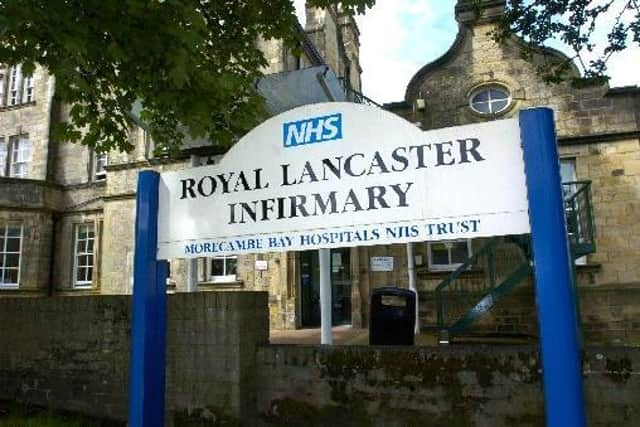Hospital staff unions raise concerns over their treatment within Morecambe Bay trust


Union Staff-Side have asked the Morecambe Bay hospitals trust to look more seriously at partnership working and say they want to be made to feel as though they are 'valuable assets' rather than 'aggressors'.
The letter was sent by the collective trade unions to chief executive Aaron Cummins and chair of the board Mike Thomas at the University Hospitals of Morecambe Bay NHS Foundation Trust (UHMBT).
Advertisement
Hide AdAdvertisement
Hide AdIt followed many in Union Staff-Side feeling there was an agenda to undermine, frustrate and thwart trade union representatives in supporting their members, promoting professional standards and highlighting patient safety issues.
One concerned trade unionist, speaking anonymously, said: "Despite the chief executive's pledge to tackle bullying the trust continues to do poorly in the staff survey with regard to bullying.
"Many trade unionists have found themselves in the firing line and feel they are being targeted with intimidation and harassment in an attempt to wear them down and force them out of the role.
"I cannot recall a time when relations between the unions and employer have been so bad at UHMBT."
Advertisement
Hide AdAdvertisement
Hide AdThe letter follows the publication of a Care Quality Commission report into UHMBT in August, in which health inspectors ordered "significant" urgent improvements at the trust after it was placed in a new form of "special measures".
The letter says that to many staff members, the findings in the report came "as no surprise whatsoever" and that there was a "sense of frustration" at the trust not learning from its mistakes.
Union Staff-Side (USS) - the combined trade unions of UHMBT NHS staff - said the feel of staff they had spoken to was that they are not listened to and do not have input into decision making - something which has been mentioned in previous staff surveys.
They said staff were also afraid to speak up or raise concerns out of fear of reprimand and being labelled as a 'troublemaker'.
Advertisement
Hide AdAdvertisement
Hide AdThey also felt basic training was often not delivered or kept up to date, and that there was a growing rift between those working on site and those working from home during the pandemic, which had not been addressed.
"Others said they had little confidence of positive change under some of the trust's current leadership," the letter said.
"Additionally, staff are telling USS that they feel there is little career progression opportunity within the trust, noting that going from Band 3 to Band 4 or going above Band 5 proved to be particularly difficult, and as such staff are looking elsewhere for work."
The letter goes on to say that USS are asking for partnership working to be more authentic and for people not to view them as aggressors or agitators but rather as "elected representatives who are there to challenge as well as to be utilised as valuable assets".
Advertisement
Hide AdAdvertisement
Hide AdBen Maden, chair of Staff-Side UHMBT, said: “The Union Staff-Side at UHMBT raised these legitimate concerns to the chief executive and the chairman of the board on behalf of our members.
"We will always help make the voice of UHMBT's colleagues heard and commend them for bravely speaking up through us. It is our hope that the trust acts on the issues raised, in partnership with us, to create an improved working experience for colleagues - in turn creating improved patient care.”
UHMBT chief executive Aaron Cummins said: “We understand all of our colleagues' concerns following the recent inspection reports by the Care Quality Commission, and the feedback of our Staff-Side in this letter we received in September is really important.
“Supported by NHS England and Improvement, we have recently launched a dedicated cultural assessment tool which will provide a baseline that will inform a structured programme of work, to ensure sustained and measured improvement in cultural and organisational development. In just over two weeks, we have already had nearly 20,000 interactions from colleagues across our trust.
Advertisement
Hide AdAdvertisement
Hide Ad“We remain committed to a real partnership approach with our Staff-Side colleagues - with the Staff-Side chair representing the organisation on the trust board as well as joining the newly established Cultural Transformation Group and Recovery Support Programme Board to ensure that the views of union members are heard and considered at every stage.”